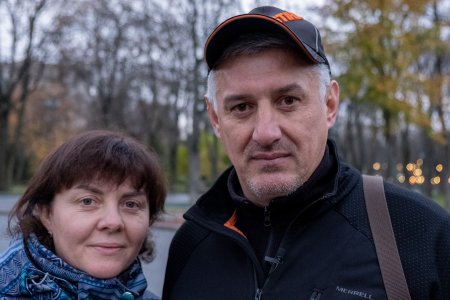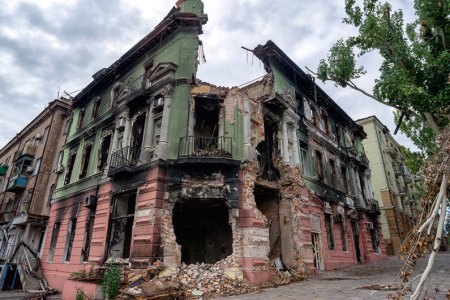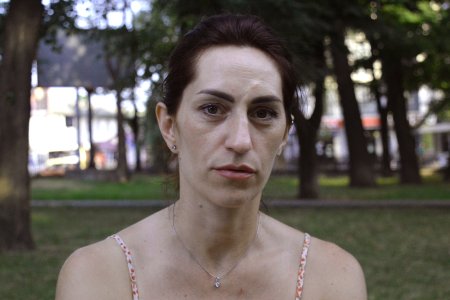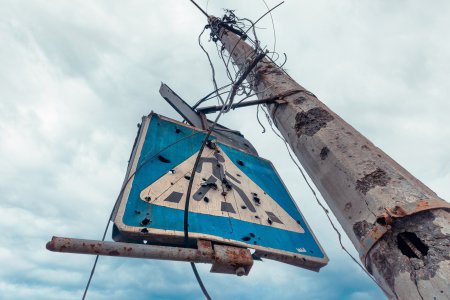I am Korniichuk Iryna Vasylivna. I am from the Luhansk region, from the city of Lysychansk. We came here with children back in April for evacuation and have stayed here for now.
How did the events of 2014 develop in your region?
In 2014, we got away with a slight fright. This was a minor scare if you compare what was then and now. In 2014, we also had to leave because caring for a bedridden grandmother was necessary. She lived on the territory of the Russian Federation. We made temporary passports for migrants. We did not receive any help and looked for work ourselves. They didn’t want to hire us in Russia because there was a significant tax on us. We also were looking for housing. Somehow we survived and returned to Ukraine, where our son was born. But early in the morning on 24 February, we heard strong explosions.
Did you witness shelling in your region in 2014?
There were shellings. We have a village nearby where 15 houses have been smashed. Our friends died, though not in front of our eyes. We learned about it later.
How did the war of 2022 burst into your life?
I didn’t expect this. At our place of work, one woman walked all the time with a passport and said: “There will be a war soon.” And I answered: “No way,” and also laughed at her. On 24 February, I went to work in the morning — how it roared! I came to work, and I thought, how to return home? There are no people, no buses. This was when the firing started. They did not touch us then; they aimed at Severodonetsk, near Severodonetsk.
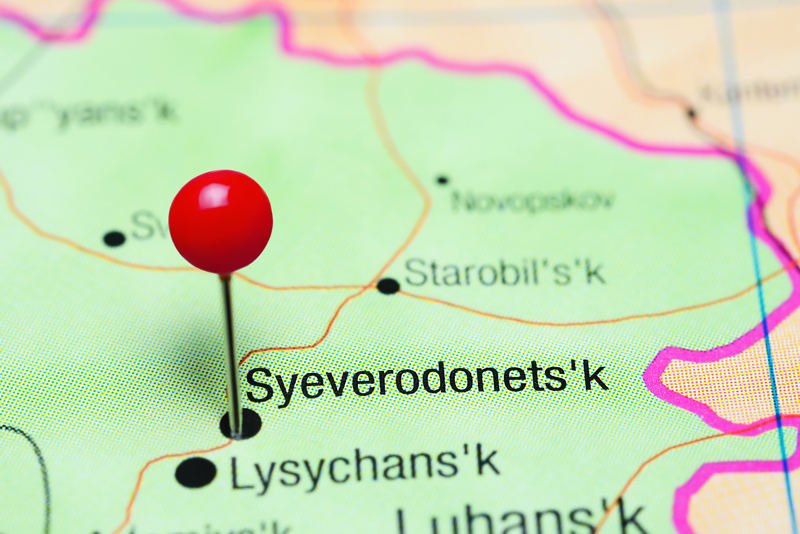
Then they got to us; we were close: Lysychansk is across the river from Severodonetsk. And then it started… On 24 February, my child and I moved to the basement where we lived.
Have you had difficulty accessing food?
I went for humanitarian aid, and the older children looked after the little ones. And my husband did the same. So we lived: we ran around finding some food. At first, food was difficult. You come to the store without cash (money is on the card.) You come, and there is nothing to take. Only a bay leaf remained or something else useless. Then the shops began to open. We bought bread: a loaf cost 30 hryvnias. The flour was terrible: gray, smelly, like oatmeal, and cost 35 to 50 hryvnia. But we had an acquaintance who worked for himself; he sold food and vegetables. So the husband went to help him because no one wanted to work. And my husband agreed.
They usually left early in the morning under shelling. An acquaintance called in for my husband, and they went to trade. The husband received money and then bought food from him. Over time, they began to bring food to school. There was such excitement. People received a handful of chicory and a piece of bread. I didn’t go at first, but then they gave us a ham. As a mother of many children, I got five hunks. Single people and families of two or three people were given three chunks each.
Has enemy shelling damaged your house?
It was 3 April when my husband barely persuaded us to go home: wash and eat. There was still light. We bathed, and there was such silence. Even though mobile communication was still catching up, I called my sister and asked: “How are you? Did you get to the house?” She said, “Yes, we are at home.” I answered: “I am grateful — at least today they let me bathe.” We woke up in the morning, and the weather was quiet, but there was some strange silence. We thought we’d get some rest. Then I got up, took the little one, and went to the kitchen. And we have a kitchen without a window; we rebuilt it like that.
Suddenly we heard — everything was shaking! There was such a crackling, such a roar, and it seemed that the roof would fly off the house.
We ran into the kitchen, stood there, and my husband sent us into the corridor. Then our windows flew out, and the frames were twisted. The roof was damaged, the plumbing was broken — all the pipes were broken. Then, as it calmed down, my husband took us to the basement again. That’s where we stayed after that.
When it snowed, the walls were covered with ice. Then we arranged with the people who left to stay at their place. They lived near the bomb shelter. We wanted to stay there for some time because the child was small, four and a half years old. He turned five here because we managed to leave before his birthday.
There was a shed nearby, and behind it, explosions began. So while it was tolerable, we sat in the house. And when it was too loud, we waited for a pause and immediately ran to the basement.
Have you witnessed the destruction of civilian facilities?
There was a day when I was helping the people my husband worked for. The husband stayed home with the children and later went to school for humanitarian aid. And the heavy shelling began; someone even hurt his leg. People immediately rushed to the school, but no one let them in, so they fled in all directions.
We were also scared then: although it did not fly toward us, the sound was terrible. So we ran, we had a playground next to the school. I stood behind the fence: out of fear, or ... The fence was all latticework. So I stood and laughed at myself: “Oh, how reliably you hid.”
Also, a shell flew near the windows of my sister’s. I can’t say for sure, but about five meters from her windows. The glass was broken.
My older children were with my sister. She lived on the first floor, and we lived on the second, so we thought it would be better if she had children. If anything, they can hide at the entrance lobby. My children miraculously remained alive — the dog saved them. It was hit and fled, and they followed it. And so they survived.
Once, I went to help sort out the onions. It was already time to return home, and it rumbled and rumbled. I listened, and it seemed not near us. I rushed home, and then it started ... A rocket hit a friend’s house. While I was walking along the school, something fell near the school, and everything was also notably damaged there.
I saw the destruction and watched Severodonetsk from a close distance. Everything exploded there. And near us, they hit either house number 10 or 11. The roof was smashed, and the pipeline was damaged. A friend of mine had a bomb hitting the dacha [summer cottage] — nothing was left of the dacha, only a moat.
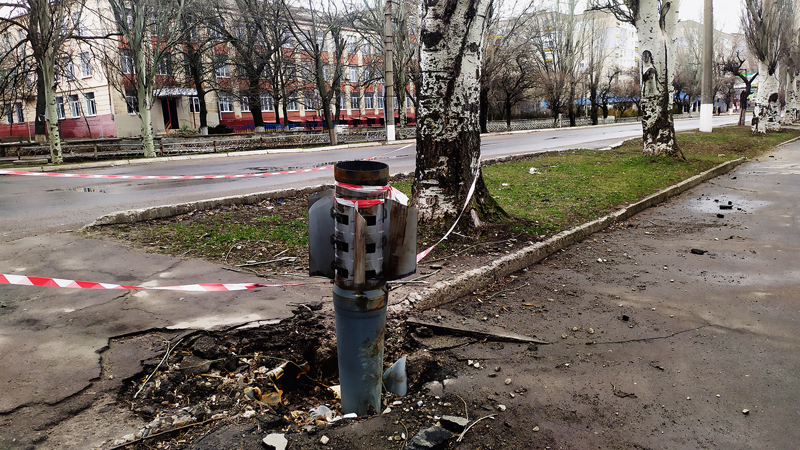
You walk along the roads — and the shells stick out from the ground like tulips. Many houses were shelled. Our village is damaged, and it’s the same in my neighborhood. There are some houses intact, but many are not. Everything was so close we heard all explosions. This is beyond words.
Have you witnessed civilian casualties?
None of mine were hurt, but it was the case among friends. I didn’t see how it all happened. I only know that they went to get food. They went four stops down, we have Krasnoe nearby (a district where humanitarian aid was given), so they went there. There were three of them: a woman with a dog who worked as a janitor in our community and two others. They were bizarre and somewhat impoverished, but still, people. All three were torn apart. Just then, the lyceum was bombed, and they were killed near the gas station.
Was it possible to receive medical services during the hostilities?
We asked all our friends — they would give us whatever they had. I treated a high temperature for three days by drinking water. I just drank water. I dozed, drank water, and somehow I got better. And then, when I arrived here, I got oral cavity sepsis. It started because of that illness. The doctor removed some tumors for me.
And so we helped each other. We cured ourselves using home supplies and first-aid kits and shared them. We had already left, but my sister stayed. She called when the connection appeared. My sister said that they were given some medicines there. Painkiller, something for blood pressure and fever. Before, there was nothing.
Did the events in Lysychansk affect the children’s mental health?
It had a profound effect on the mentality of the children. Older children, 12-13 years old, began to smoke and demanded cigarettes. It happened not only to my children but to all. Children became quarrelsome and irritable. And younger kids trembled from the noise and screamed when the siren howled. We did not have a siren in Lysychansk, and there was no warning. In Severodonetsk, sometimes a siren wailed, but not in our city. Explosions began, and only then would we understand that we must run. It took two minutes to get to the basement during the calm period.
I used to run barefoot at night with slippers in my hands. I flew! I realized it was cold only after getting to the basement; that is, in what I was, I ran in that.
The husband carried our son because I wasn’t sure I could do it in the dark. There was no light. The younger one began to wet his bed every other day. When he heard a little bang, he immediately asked: “Mom, what is this?” The car will hum — “Mom, what is this?” Now he sleeps with me because he is scared. We walk, and as soon as he hears a siren, he immediately runs: his lips turn white, then blue, and his heart is pounding. He is not well. As far as I know, there are a lot of such children — all this greatly influenced them. My son will probably never forget this. Something flew in one and a half or two months ago; perhaps, ours shot down something, and we heard it. God, he was like a partisan: he darted into the entrance instantly. He grabbed my bags of groceries, dragging them, and I stood — I couldn’t move and was shaking. I said: “Son, leave them, run!” And he: “What about the bags?”
We got a dog so the youngest would not be bored, have fun, and come to his senses. They say animals cure stress. It’s good that the son is talking incessantly. This is very good. Because in 2014, our acquaintances’ son became autistic. That’s how it all affected him.
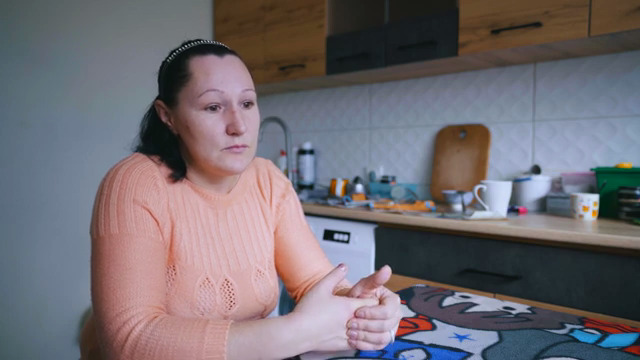
What prompted you to evacuate from Lysychansk?
We were at our neighbors’; we asked to live in their apartment. They have a barn in the yard and a small path where a car can pass. And behind the barn was a gas booth, where we had kiosks. It was targeted every night, so the house was trembling. I thought we would get buried and won’t get out. I felt a shell would kill us: they beat us very hard. Finally, I could not stand it; I called a man I knew, who evacuated people for free. However, we had to walk to the fire station, and it was scary with children.
I was not afraid for myself, but I was very worried about the children. I was fearful that they would see me being killed. I was scared to see them destroyed.
To avoid walking, I asked: “Can you come to pick us up because it’s terrifying?” He said, “I can.” So at ten in the morning, he drove up to the kiosks, and as soon as we got out, it flew into the village, somewhere nearby. I said: “Come on, let’s go!” I kissed the icon all the way and hugged the younger one. It was horrifying; the whole city was destroyed. We waited for the train, drove to Sloviansk, and from there to Lviv. In Sloviansk, we stood for a long time while the siren howled non-stop.
And then I heard “Grad” [rockets] banged, and I thought: “Where can we hide here?” So I sat on the platform and planned: “If anything, I will push the children there,” — I moved closer to the rails. It was frightening. At ten o’clock, we boarded the train. It moved, then we stopped because there was shelling. That’s how we left. I still don’t believe that we are alive… We eat, we sleep… We often dream about home. We didn’t take any clothes or photographs; we only took documents. We went in what we were.
Do you plan to return home after the end of the war?
I won’t go back there. There is an occupation now. I know our guys will win back our land, but we have nowhere to return. No one will build anything there. Thankfully we are still young. We can make something and earn money. I pity pensioners. There was a nest, but now it is gone ...
I would like to return and go again to my father’s grave. And that’s it. Only fear left.
Twice I went back there, and twice this happened. I won’t be back for the third time. No, I won’t be back. Let’s make some arrangements here. The kids are growing and learning. We will earn while the hands are working and the legs are walking. After everything that happened, the desire to save something, to collect, died in my soul. The future just disappeared. For whom? So we would lose everything again? For what? To drop everything and run again?
I don’t even know what to call them. They were not born by a woman. Where did they come from? It’s impossible — we did not invade them. They entered by force “to rescue” us. From whom? Us — from ourselves? I thought before our life wasn’t great, but still, we lived ...
